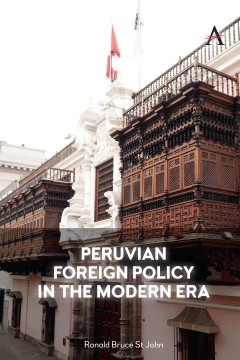Other Formats Available:
- About This Book
- Reviews
- Author Information
- Series
- Table of Contents
- Links
- Podcasts
About This Book
Peruvian Foreign Policy in the Modern Era is a chronological treatment of Peruvian foreign policy from 1990 to the present. It focuses on the impact of domestic politics, economic interests, security concerns, and alliance diplomacy on contemporary Peruvian foreign policy.
For 200 years, the foreign policy of Peru has focused on the achievement of core objectives central to the well-being of any state, including sovereignty, territorial integrity, economic independence, national security, and continental solidarity. In pursuit of these objectives, the content and direction of Peruvian foreign policy was heavily influenced by the conflicting demands of independence and interdependence as determined by multiple internal and external forces. An examination of Peruvian foreign policy in the modern era reveals the full extent to which it continues to be characterized by a strong linkage between domestic and foreign concerns with domestic considerations often influencing, if not determining, aspects of the nation’s international posture. Violence also remains integral to the Peruvian political system with external policy often a reflection of domestic politics. Finally, the location and size of Peru, the export-led nature of its economy, and the relationships it developed with regional and international powers remain strong influences on contemporary Peruvian foreign policy. In common with many states, sovereignty, territorial integrity, regionalism, continental solidarity, and economic independence remained core goals of Peruvian foreign policy after independence. In recent times, successive Peruvian governments have continued to address these and related issues in a foreign policy grounded in pragmatism and notable for its emphasis on a rational combination of continuity and change. The Fujimori administration (1990–2000) set the stage for this shift in the direction, tone, and content of the nation’s foreign policy, and the Toledo administration and its successors refined and built upon the initiatives launched by Fujimori.
Reviews
Interviews with successive presidents and leading diplomats add to the richness of the book. The clear, tight narrative makes this volume attractive to undergraduates as well as professionals—CHOICE
“For much of the new century, and despite its sometimes chaotic politics, Peru has been among the fastest-growing and best performing economies in Latin America. In this book, based on extensive interviews with the country's top leaders, Ronald Bruce St John provides a concise but thorough overview of Peruvian foreign policy in the recent past—one of the sources of this remarkable performance. An important book for anyone interested in Peru's international relations, the country that gave us the Pacific Alliance" — Jorge Heine, Research Professor, Frederick S. Pardee School of Global Studies, Boston University.
“St John’s knowledge of Peruvian foreign policy is extraordinary. Utilizing extensive interviews with former Peruvian presidents and ministers, St John makes a compelling argument that, in recent decades, Peru has reached out to resolve border conflicts and build relationships with countries other than the United States, in particular China.”—Cynthia McClintock, Professor of Political Science and International Affairs, George Washington University.
“In this book, Ronald Bruce St John presents a rigorous, scholarly examination of Peru’s diplomatic trajectory spanning three decades. This comprehensive work offers invaluable insights into the intricacies of Latin American international relations, making it essential reading for academics and researchers in the field.”—Alvaro Mendez, Senior Research Fellow, London School of Economics and Political Science, co-author of China and Latin America: Development, Agency and Geopolitics (Bloomsbury, 2023).
“An essential book to understand about Peruvian foreign policy in recent times. Demonstrating a broad knowledge of Peru, Ronald Bruce St John provides a detailed and exhaustive review of the main characteristics and moments that have determined Peru’s international actions from 1990 to the present.”—Oscar Vidarte A., Associate Professor, Pontificia Universidad Católica del Perú.
“This is a book that combines historical and political analysis with international relations. Ronald Bruce St John updates his studies on Peruvian foreign policy, placing them in the longest period of democracy and economic growth in the country. An essential text to understand the link between Peru and the world.”—Jose Alejandro Godoy, Political Scientist, PUCP—University of the Pacific.
“Focusing now on the ‘modern era’, Ronald Bruce St John completes his excellent summary of Peruvian Foreign Policy spanning through two world systems (pre- and post-war II) and the transit to a new world order. Concentration in the interplay of local and international circumstances over systemic issues provides the public with a comprehensive and very useful explanation of Peru’s evolving international insertion.” —Alejandro Deustua, Titular Member of the Peruvian Society of International Law.
St. John’s Peruvian Foreign Policy in the Modern Era should be regarded as a valuable addition to the existing historiography on Peruvian foreign relations contributed by scholars such as Norberto Barreto Velázquez, Hal Brands, Lawrence A. Clayton, and Richard J. Walter—Strategic Visions
The book offers a well-written, admirably up-to-date overview of Peruvian foreign policy over the last three decades. St John provides a fair and balanced assessment of the players involved, with only the Peruvian Diplomatic Service receiving unalloyed praise. It will be of interest to students of Latin American foreign policy and area studies, as well as policy-makers in the region— International Affairs
Author Information
Ronald Bruce St John first conducted research in Peru in 1968 and since then has published several monographs on the Andean region, including The Foreign Policy of Peru (1992), Toledo’s Peru: Vision and Reality (2010), and Bolivia: Geopolitics of a Landlocked State ( 2020).
Series
Anthem Impact
Table of Contents
List of Figures; Acknowledgments; Abbreviations; 1. Introduction; 2. Alberto Kenya Fujimori, 1990–2000 and Valentín Paniagua Corazao, 2000–2001; 3. Alejandro Celestino Toledo Manrique, 2001–2006; 4. Alan García Pérez, 2006–2011; 5. Ollanta Humala Tasso, 2011–2016; 6. Pedro-Pablo Kuczynski Godard to Francisco Rafael Sagasti Hochhausler, 2016–2021; 7. José Pedro Castillo Terrones to Dina Ercilia Boluarte Zegarra, 2021–2023; 8. Conclusions; Works Cited; Index
Links
Stay Updated
Information
Latest Tweets



